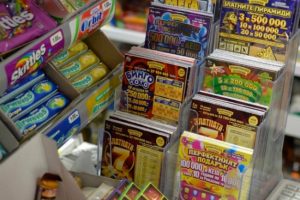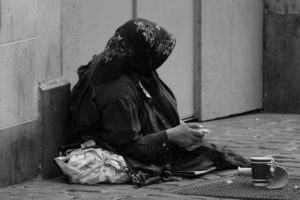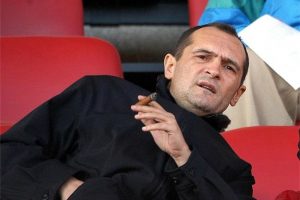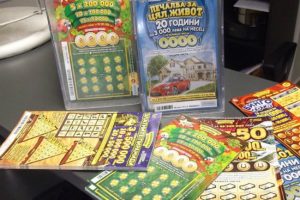 A new tendency seems to overwhelm people in Bulgaria and that is the National Lottery’s scratch-off tickets. Walking on the streets of any city (even villages) in Bulgaria, one can see small kiosks, flocked with people, who are frantically scratching the tickets of hope. Their hands are shaking most probably because they have scratched so much of these lucky cards, so that they have developed some form of hand tremor. It is not a single case in which an old lady or gentleman is waiting in the line at the supermarket, doing “groceries”, consisting of multiple scratch-off lottery tickets and probably a loaf of bread. At the cashier, if it turns out that the money is not enough, the chance to leave the bread and take only the tickets is times bigger.
A new tendency seems to overwhelm people in Bulgaria and that is the National Lottery’s scratch-off tickets. Walking on the streets of any city (even villages) in Bulgaria, one can see small kiosks, flocked with people, who are frantically scratching the tickets of hope. Their hands are shaking most probably because they have scratched so much of these lucky cards, so that they have developed some form of hand tremor. It is not a single case in which an old lady or gentleman is waiting in the line at the supermarket, doing “groceries”, consisting of multiple scratch-off lottery tickets and probably a loaf of bread. At the cashier, if it turns out that the money is not enough, the chance to leave the bread and take only the tickets is times bigger.
Economic Situation in Bulgaria
 It is not a secret that the most vulnerable people are those with financial difficulties. They often fall into the gambling trap, lured by the idea of winning “easy money”. To better explain the reasons why so many people are obsessed with these scratch-off lottery tickets, it is worth to shed light on the economic situation in Bulgaria, which is honestly not really thriving.
It is not a secret that the most vulnerable people are those with financial difficulties. They often fall into the gambling trap, lured by the idea of winning “easy money”. To better explain the reasons why so many people are obsessed with these scratch-off lottery tickets, it is worth to shed light on the economic situation in Bulgaria, which is honestly not really thriving.
According to a research, conducted in 2016 by Eurostat, 2.5 million Bulgarians (which is 35% of the total population) live in poverty. These figures are more than alarming. Apart from that, it was estimated that more than 80% of the families’ income is spent on basic needs such as electricity, food and etc. Currently, the minimum wage in Bulgaria is BGN460 (€235.20) per month, while Bulgaria’s average monthly wage is more than BGN1000. This amount could be sufficient for the average Bulgarian to avoid any financial hardships.
Unfortunately, it appears that there is almost no middle class in Bulgaria, as the salaries are either really high or embarrassingly low. A major problem which appears among the working class is that many employees in Bulgaria work without a contract. These people are often either not paid at all, or they work for below the minimum wage.
Another shocking revelation is related to the retired people in Bulgaria. After a number of increases (the last being introduced on 1st July 2017), the retired people currently pocket the “solid” amount of BGN180 per month. Many people would say that this is the minimum amount and not all the people get the minimum. That is absolutely true, but the National Social Security Institute reported that almost ¼ of the retired people in Bulgaria count on the minimum amount. Speaking of the minimum amount, it is also worth to mention that the pension cap is BGN910 and around 2.8% of all the pensioners in Bulgaria can enjoy amounts above BGN800 up to BGN910.
This brief overview of the economic situation in Bulgaria excuses to some extent the gambling obsession of the country’s residents as hope dies last. No matter how unreasonable may sound, there are so many Bulgarians who prefer to spend their money on lucky tickets, coffee, and cigarettes than on breakfast.
Lottery Games in Bulgaria
 Currently, lottery games in Bulgaria are 3 in total – the private National Lottery and Bulgaria’s National Lottery, and the Bulgarian Sports Totalizator, which is owned by the country. The two private lottery companies are known to be owned by the businessman Vasil Krumov Bozhkov, considered to be one of the richest (if not the richest) person in Bulgaria.
Currently, lottery games in Bulgaria are 3 in total – the private National Lottery and Bulgaria’s National Lottery, and the Bulgarian Sports Totalizator, which is owned by the country. The two private lottery companies are known to be owned by the businessman Vasil Krumov Bozhkov, considered to be one of the richest (if not the richest) person in Bulgaria.
Mr. Bozhkov is also the owner of the sportsbook Eurofootball, through which he first promoted his lottery tickets, before these entered almost every shop in Bulgaria. The name of the Bulgarian politician Delyan Peevski also is linked to the private 2 private lotteries, as he is the co-owner. Nevertheless, it is a public secret that Vasil Bozhkov remains the leading figure behind the two lottery games and the sportsbook Eurofootball.
In 2014, it emerged on the surface that Mr. Bozhkov saved almost BGN30 million from taxes due to an amendment in the country’s gambling law introduced by the administration of Plamen Oresharski. Under the changes, which came into effect on 1st January 2014, all lottery games, card games and bingo halls were exempt from taxes. This led to a significant loss of at least BGN30 million, which could bridge some gaps in the country’s budget. Later on, the changes were repealed and in 2015 Bulgaria reported income of BGN37 million, generated by the 15% taxes on the gambling operations.
Moreover, it is worth to mention that Bulgaria’s current Prime Minister Boyko Borisov allowed the lucky tickets to enter every shop in Bulgaria. Along with the tax-free status for an year, this is the second time in which the Bulgarian government gave a strong push forward to Mr. Bozhkov’s lotteries – a business, which brings pretty stable income to its owners.
Conclusion
 Vasil Bozhkov’s lottery games, including National Lottery and Bulgaria’s National Lottery, seem to earn from people’s despair, lack of money, and hope. Most of the people do not realize that scratching a ticket is a form of gambling and underestimate the problem. Even parents started to urge their children to choose a ticket, hoping that the kids are luckier. Another major problem is that everyone can buy a ticket, including minors under 18, teaching them to rely on their luck instead of on their skills in life. Bulgaria’s government needs to tighten its gambling law before it is too late and the things go completely off the rails.
Vasil Bozhkov’s lottery games, including National Lottery and Bulgaria’s National Lottery, seem to earn from people’s despair, lack of money, and hope. Most of the people do not realize that scratching a ticket is a form of gambling and underestimate the problem. Even parents started to urge their children to choose a ticket, hoping that the kids are luckier. Another major problem is that everyone can buy a ticket, including minors under 18, teaching them to rely on their luck instead of on their skills in life. Bulgaria’s government needs to tighten its gambling law before it is too late and the things go completely off the rails.



















